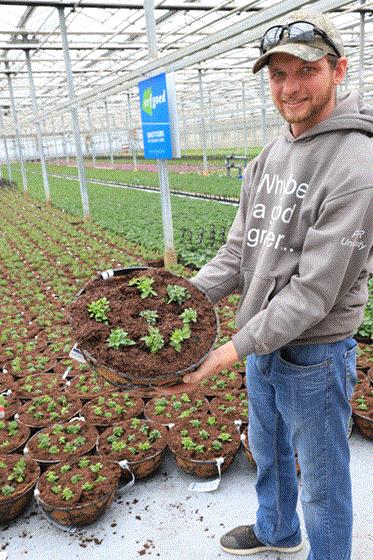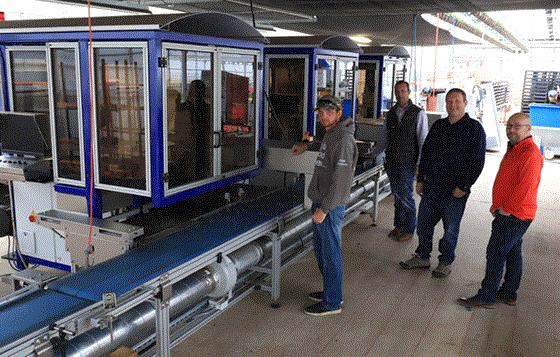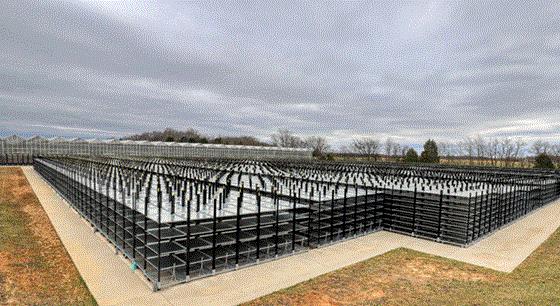Eastern Kentucky: the next Netherlands?
That’s how a fellow named Jonathan Webb sees the Bluegrass state. A Kentucky native, he wants to turn the impoverished Appalachia coal-mining region into a high-tech ag powerhouse by bringing hydroponic greenhouse technology to the region. And he’s got some big backers, including AOL founder Steve Case.
I learned all this Sunday night on 60 Minutes. Now, I don’t expect to find horticulture featured on 60 Minutes, although it has happened on occasion—for instance, that’s how I learned about MIT’s “Food Computers.”
Last Sunday night, the news show did a feature on Steve Case’s quest (via bus) to bring venture capital to the middle of America, rather than letting it all stay concentrated on the coast. The project is called “Rise of the Rest,” and he’s joined by some serious business leaders, including Amazon founder Jeff Bezos, Starbucks’ Howard Schultz and former Google CEO Eric Schmidt. They want to find and fund entrepreneurs in areas of the country usually overlooked by venture capitalists.
One such investment is in Jonathan Webb’s company, AppHarvest.
“We could fit the entire country of the Netherlands inside of Eastern Kentucky in landmass,” Jonathan told WKYT in Lexington. “The Netherlands has the second most agricultural exports in the world, only behind the U.S. They’re growing indoors, using artificial lighting to maximize yields, while also putting the water directly to the roots of the plants. We need 80 to 90 percent less water than open-field agriculture. We’re able to grow year round because of the controlled environment.”
In addition, Eastern Kentucky is within a day’s drive of 70% of the U.S. population. And Jonathan feels the residents of the region have what it takes to make such a project successful.
“It’s that work ethic, that tenacity, that grit that we’re trying to harness for this industry.”
Jonathan spent two years trying to line up their first greenhouse site only to have the deal fall apart. Now they’ve got their eyes on a new parcel in the city of Morehead, where they’re planning to build a 60-acre hydroponic tomato range that would employ about 285 full-time workers. Pay will be at least $13 an hour—nearly double the state’s minimum wage—plus benefits.

Artist's rendition of an AppHarvest facility. I love that it's an actual real-world greenhouse, not a warehouse or, heaven forbid, a converted coal mine.
To prepare future employees for this site and at the additional facilities AppHarvest wants to build, AppHarvest is organizing AgTech education programs in high schools, specializing in entrepreneurship and high-tech agriculture. They’re currently working with the University of Pikeville and Shelby Valley High School, where students are growing lettuce in a container farm.
Says Jonathan, “We’re positioning the eastern part of our state to be the AgTech of America.”
That project sounds promising. I like that it’s greenhouse-based—a proven technology. I like that he’s been to the Netherlands to see it done on a large scale. And I like that all eight folks listed as leaders in AppHarvest are Kentucky natives. They’ll know the challenges of the geography, the culture and the climate.
Expect us to follow this project closely to see if they can make it work.

A quick trip to Tennessee
I flew over Kentucky last Friday morning for a quick visit to Tennessee and a pair of interesting, successful greenhouses: South Central Growers in Springfield, about an hour above Nashville; and Holtkamp Greenhouses, home of the famous Optimara violet brand. They’re about a mile from downtown Nashville. I’ve been to both places, but not for years, so I thought it was time to catch up. Here are a few notes:
At South Central Growers
South Central is owned by Alex, Ron and Tim Van Der Hengst. They’re cousins to the Van Wingerdens; their mom is a daughter of Aart and Cora Van Wingerden, the Dutch couple who started it all when they emigrated to the U.S. in 1948. I hadn’t visited South Central since 1995, when I did a big East Coast swing to get to know most of the Van Wingerden clan.
There’s been a few changes since then: namely, they’ve taken over the place from their parents; it’s grown from 4.5 to 23.5 acres (not counting outdoor production, which has actually shrunk a bit); product mix has changed from 606 packs, 6 in. pots and baskets to every container imaginable; and their sales volume has increased “drastically” while their profits have decreased.
Isn’t that the story everywhere?
Still, business is strong and growing, and they’ve made several investments to keep it that way. The first is a switch to a HydraFiber/peat potting mix, eliminating perlite. After testing it, they went all in, and now buy 1,000 tons a year of the 70/30 and 60/40 (peat/HydraFiber) blends. It’s cost effective, holds water better than their old mix, and they don’t have perlite beads blowing all over the greenhouse.

Tim Van Der Hengst with a basket filled with peat/HydraFiber. After some testing,
they went all-in three years ago.

Robotic sticking, bigger racks
Next is an investment in three ISO robotic cutting stickers. Installed last December, they’ll plant about 4 million URCs at a pace of 2,600 per hour per machine. They’re sticking into their own custom tray which is similar to what you see across Europe: it has legs, which keeps it off the floor for better irrigation and airflow.
 Tim, Ron and Alex and Director of Sales Derek Clark with their three new ISO planting robots.
Tim, Ron and Alex and Director of Sales Derek Clark with their three new ISO planting robots.
Lastly is an investment in 8,000 new shipping racks. They’re switching their entire fleet over from the older 22 in. x 57 in. size to a more efficient 31 in. x 44 in. size. Why? “Freight,” answered Ron. They’ll get 20% more product in each truck with the new rack size.
 What 8,000 shipping racks looks like. Probably the last time they'll be this many in one spot ... and this shiny.
What 8,000 shipping racks looks like. Probably the last time they'll be this many in one spot ... and this shiny.
African violets, houseplants and e-commerce at Holtkamp’s
I love this place because it offers up so much horticultural history along with modern breeding and marketing—especially since young Lawrence Holtkamp came on board in 2015 to handle e-commerce. I stopped by to catch up with Lawrence and his dad, Reinhold, to see how Holtkamp is keeping its Optimara African violet fresh.
 When the wind blows just right, you can probably hear the faint country twanging of the Grand Ole Opry.
When the wind blows just right, you can probably hear the faint country twanging of the Grand Ole Opry.
The facilities, located just over a mile from downtown Nashville (the land must be worth a fortune!) are the former home of the Joy Floral Co., founded in 1877. There are still a few old structures, including a massive chimney that dates from 1910, Reinhold says. The greenhouses include a few head-knockers from the energy crisis days when lower was better, along with more updated Dutch Venlo. They’re as efficient as the sprawling site and diverse crop mix allows; for instance, they installed Dutch trays back in the early ’80s, probably one of the earliest such setups in America at the time.

The past is past—what about the future?
That lies in breeding, most notably their newest line of violets, called LooXo (say “looks so” as in LooXo gorgeous, LooXo splendid, LooXo radiant and LooXo heavenly). Bred by Reinhold’s cousin Martin in Germany, these violets are “filantherless,” meaning they do not have the normal anthers and filaments on the flowers. You can tell them from regular violets by the lack of a yellow center to the flower.

LooXo gorgeous, looking gorgeous. (And yes, the variety name is lower case.)
The benefit, explains Reinhold, is that they don’t attract thrips or harbor other pollen-seeking insects or diseases such as botrytis. That means less chemical use for growers. For consumers, plants stay healthier and bloom longer. Launched last summer, LooXo will soon have 28 varieties, with virtually any Optimara variety able to be converted over to filantherless. Reinhold predicts that in 10 years there won’t be any anthers in Optimara violets.
“That is where we think the future is for the African Violet.”

Online plant sales
Holtkamp's may have been the first big grower in the U.S. to recognize Pilea peperomioides as an online "it" plant. Lawrence recalls that, 2 1/2 years ago, he was asked about the plant by a consumer. Unfamiliar with the species, he had to look it up.
“It was a cool-looking plant," he recalls. "And then I looked at the prices and they were outrageous. I was like, ‘Okay, well, I guess I need to be looking for this!’”
It took much digging, but they finally found a European grower who had some and bought out his entire supply. Now they’ve got their own stock, and the plants reproduce like crazy.
Pilea was the variety that launched Lawrence into online sales. He began offering it on eBay and Etsy, then added Amazon when it became obvious how powerful that online merchant was becoming. He slowly added other plants as interest and sales grew. Eventually, he developed a program of variety packs that allows customers to get a nice selection without giving them the chance to be specific about colors and varieties. Plants get shipped three days a week, Monday, Wednesday and Friday from a corner of a warehouse.
“Most of what I offer is variety packs,” he says, “like fern variety packs, rex begonia variety packs, we just added anthuriums, violets. Two-inch terrarium plants. And the Pilea peperomiodes. All variety packs, without having to get into specific [cultivars]. It allows me to send the nicest plants.”
I had heard that Ebay and Etsy customers are easier to please than Amazon customers, and Lawrence confirmed that.
“On Etsy, rarely will you have anyone give you a bad review if you fix the problem.” Whereas on Amazon, “They jump to leave a bad review at the drop of a hat and not give you the chance to make it right.”
The solution? He puts a note in each box saying, “If you have a problem, just contact us—we can make it right.” He says that’s helped a lot.

Nexus founder passes away
I’ve only known Cheryl Longtin and Mike Porter as Nexus Greenhouse Company owners (until they sold it to Gibraltar Industries in 2016, that is), but they bought it from the original founder, Donald Edwin McCrimmon. The long-time Colorado resident and engineer passed away March 8 at the age of 94.
Don, who earned a degree in civil engineering from Colorado State, founded Nexus in 1967 to answer the industry’s need for a well-built greenhouse that would meet building requirements and withstand severe weather. It was one of his many business ventures, including Dalco Engineering, a steel fabrication company. He sold the business in 1994 to Cheryl and Mike, whose experience in international corporations allowed Nexus to go beyond the traditional greenhouse manufacturing role. Don’s legacy lives on at Nexus even under the current Gibraltar ownership: his son-in-law Craig Kaiser is operations vice president and his grandson Aric is a customer service representative.

Do a hort program at Longwood Gardens
It’s cool enough to visit Longwood Gardens, but to do a two-year paid residency there? Sign me up!
Longwood, in Kennett Square, Pennsylvania, is once again offering a Professional Horticulture Program (formerly the Professional Gardener Program), aimed to prepare students for rewarding careers in horticulture. Applications are now open for the two-year, tuition-free residential program, which Longwood has been offering since 1970.
Designed for anyone from recent high school graduates to mid-life career-changers, the program offers practical experience, coursework, hands-on projects and study abroad opportunities in one of the great gardens of the world, learning from Longwood’s expert staff. Graduates go on to successful careers in public, private and commercial horticulture.
Did I mention it’s tuition-free? Not only that, you’ll live rent-free on the Longwood grounds, receive hourly pay, and enjoy a number of other benefits.
Interested? Then visit longwoodgardens.org/education for more information and to apply. Applications close May 15.

Visit South Africa with Valleybrook’s John Schroeder
If you only have a couple of weeks, not two years, how about an educational (and write-off-able) trip to South Africa? My good friend John Schroeder of Valleybrook Gardens in British Columbia is an accomplished traveler who enjoys nothing more than organizing horticultural tours to the world’s garden spots (last fall he was in Vietnam).
This time, he’s making his fourth trip to South Africa. The exclusive, 16-person-max tour, slated for October, will feature amazing nurseries, world-class garden centers, beautiful gardens (including Kirstenbosch), private gardens, the wine regions … “the list goes on!” John says. Topping it off will be a three-day “bucket-list-busting” safari. And if it’s enough to bust John’s bucket list, well, I can’t begin to imagine what over-the-top adventure he’s got planned for you.

The view of Cape Town from Table Mountain. Kirstenbosch is down the side. Yes, I was fortunate enough to take the photo. An amazing country!
Interested in checking South Africa off your bucket list? Then email John at js@valleybrook.com for more details.

Finally …
I don’t know whether to be excited or scared: Thursday, Jen, Ellen and I head out to California for our annual coverage of the 2019 Spring Trials. Which means two things: six days and nights of Acres of buZZ! Spring Trials recap newsletters, and dozens of bobblehead videos. I believe it's the 11th time for the three of us to travel together; and, well, if we haven't killed each other yet, I reckon we never will.
We will be visiting the trials Friday through Wednesday, with six daily highlight emails going out starting late Friday night (or early Saturday morning, depending on how well the technology works). Watch for our reports in your inbox, check out our videos, and share it all with your friends and colleagues who can’t make it to California. If you get this newsletter, you'll automatically get Acres of buZZ!
Let us know we aren’t doing it for our health … or for all the good California wine we have to consume to survive the 18-hour days.
If you’ll be on the Trials trail yourself, say hello and let us know what you’ve seen that blows your skirt up.

See you next time,

Chris Beytes
Editor
GrowerTalks and Green Profit
This e-mail received by 23,552 loyal readers!
Thanks to my loyal sponsors, who help me reach the 23,552 readers of Acres Online in 66 countries. Want to be one of them (a sponsor, that is)? Give Paul Black a shout and he'll hook you up.